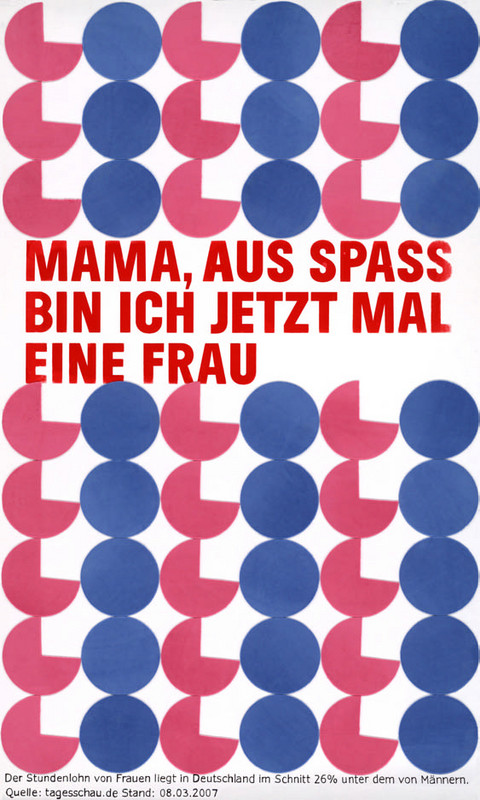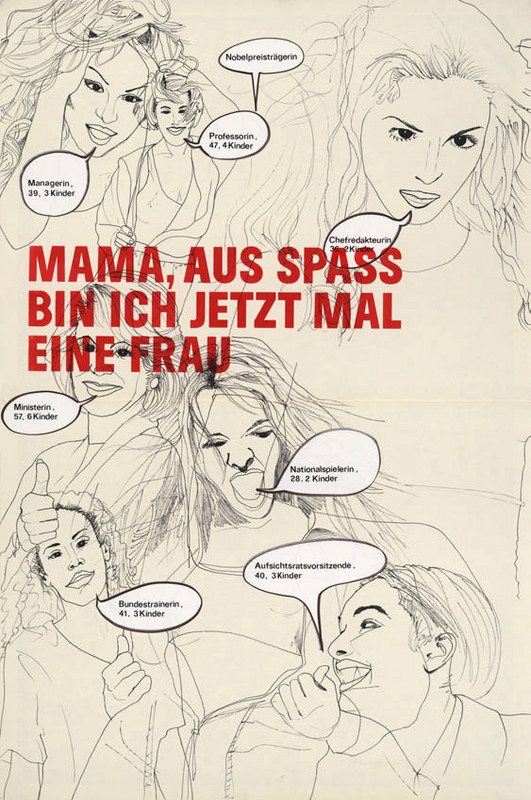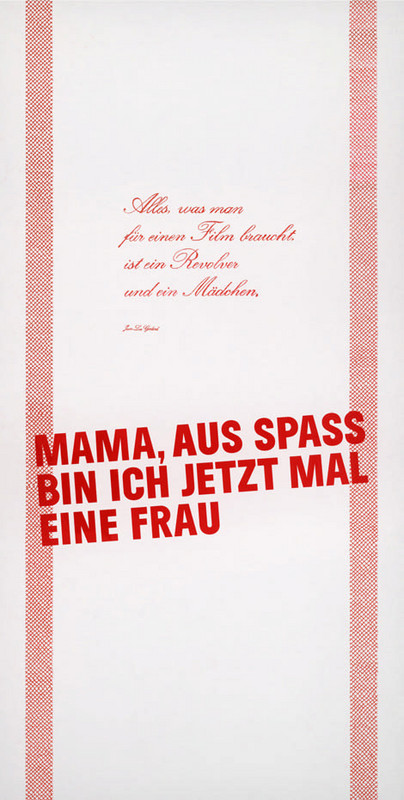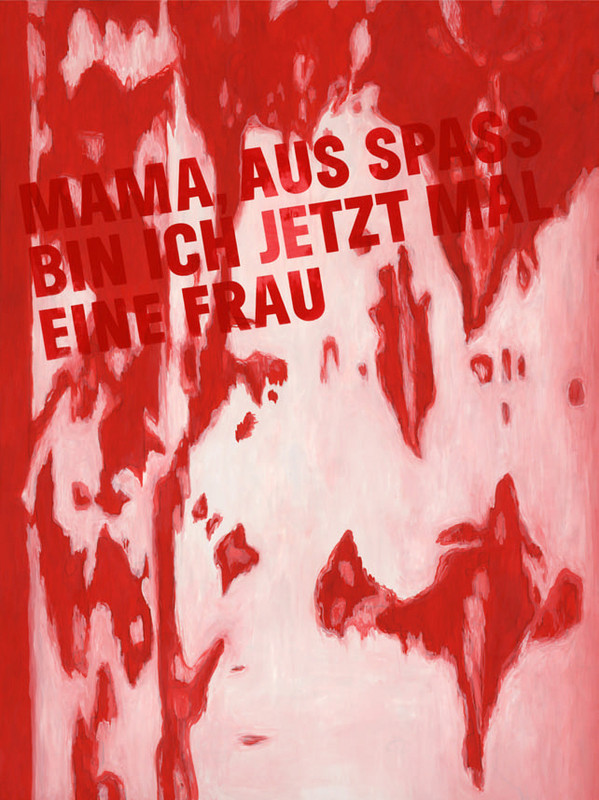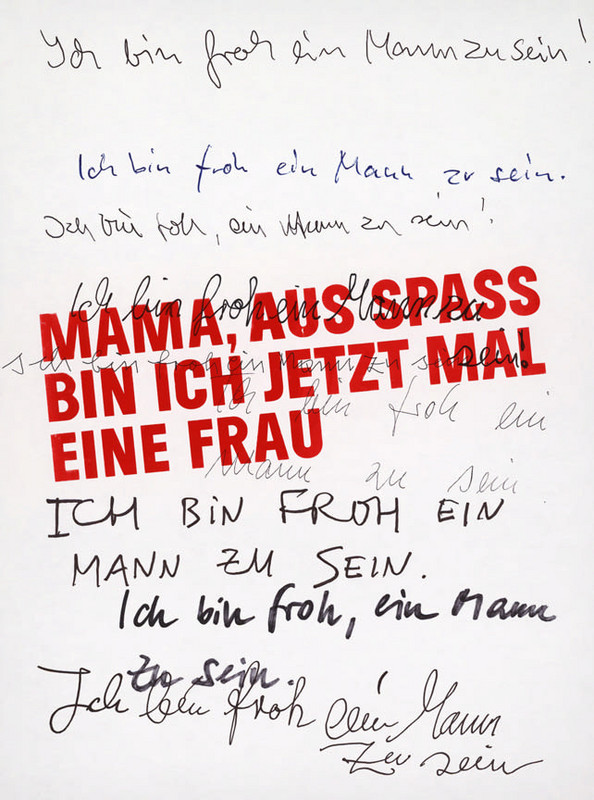Bea Meyer MAMA, AUS SPASS BIN ICH JETZT MAL EINE FRAU
22 Mar - 26 Apr 2008
MUM, JUST FOR FUN I’M A WOMAN NOW!
“The private is political” – the ubiquitous anniversary of the 1968 student revolts has given this slogan a new lease of life: the call of the women challenging their male comrades who, in their revolutionary fervour, would have loved to stop at their own doorstep and leave things just the way they were as far as role allocation went. The slogan launched a new feminism that pleaded for gender mainstreaming in all areas of society – and this meant in private life as well. All water under the bridges now? Or rather time for a re-enactment*? When Bea Meyer, in her latest work, reminds us that women still earn a quarter less than men, then it is not to be understood as a form of taking stock forty years later. Her motivation is much more current: a spontaneous utterance by her daughter. This, if one were to take it literally, can be read entirely in the context of contemporary gender theories. “Being a woman” and “being a man” – this is a play we daily perform, a play in which we daily enact what “being a woman” and “being a man” means. For us adults, however, it’s no longer a matter of “fun”, the binary allocation of roles has long taken place, the script leaves little room for improvisation and an outright denial is only possible at the price of marginalisation. Bea Meyer puts the rule to the test – she evaluates what it means, in all seriousness, to play in the women’s league. Yes, a higher life expectancy, for instance, yet currently also five times less of a chance of being ranked among the top 100 artists. But Meyer does not merely want to present dry statistics that could just as much be checked elsewhere. Data is configured alongside icons, colour symbolism and quotations together with various forms of visual rhetoric – advertisements, film posters, blackboards – and a whole spectrum of artistic techniques – drawing, painting, stamping, marking, writing – to achieve works that are aesthetically productive. What emerges are displays individually designed which, through combination and adaptation, give an entirely new twist to what we thought we knew and make us doubt our entrenched set of values. It’s as if we were confronted with the film-god Godard’s famous macho motto – “all you need for a movie is a girl and a gun” – as a dowdy piece of household wisdom.
“Ich bin froh, ein Mann zu sein” (I am happy to be a man) – Meyer had several men from her circle of friends write this sentence like extra homework during school detention on one of her posters (leniently only once per person!). Words for which good reasons can still be found. “Girls can wear jeans / and cut their hair short / Wear shirts and boots / ’cause its o.k. to be a boy / But for a boy to look like a girl is degrading / ’cause you think that being a girl is degrading [...]”**: even Madonna, the post-feminist icon, is very aware of the hierarchies still present in gender play. Long is the list of derogatory expressions among colloquial euphemisms for women – and Meyer chose some, tracing them in large, hollow letters. For Meyer’s still illiterate daughter they are nothing but empty contours to colour in brightly. Juni has, so to speak, left her mark on her mother’s works – her quote is printed on every image of the series – but these do not merely describe a condition or state. They are rather more performative in the sense that they arouse fixed preconceptions. They look towards a future in which the joy of womanhood does not threaten to disappear sometime, in which guys, to use the lyrics of Madonna’s song, don’t hide their desire to know “how it feels like for a girl” and the girls don’t hide their inner strength, and in which the group of career women with children, as in one of Meyer’s posters, is neither seen as a provocation, nor quickly unmasked as a fiction; and, finally, in which the act of “gender-making” becomes a voluntary game in which there might also be more than two attractive roles.
Susanne Holschbach, 2008
*Re-enactment is usually understood as a re-play or a reperformance of historic events yet, in a legal sense, it implies “bringing something back into force or effect”.
**Madonna: “How it Feels for a Girl”, from the album
Music, Maverick/Warner Bros. 2000.
“The private is political” – the ubiquitous anniversary of the 1968 student revolts has given this slogan a new lease of life: the call of the women challenging their male comrades who, in their revolutionary fervour, would have loved to stop at their own doorstep and leave things just the way they were as far as role allocation went. The slogan launched a new feminism that pleaded for gender mainstreaming in all areas of society – and this meant in private life as well. All water under the bridges now? Or rather time for a re-enactment*? When Bea Meyer, in her latest work, reminds us that women still earn a quarter less than men, then it is not to be understood as a form of taking stock forty years later. Her motivation is much more current: a spontaneous utterance by her daughter. This, if one were to take it literally, can be read entirely in the context of contemporary gender theories. “Being a woman” and “being a man” – this is a play we daily perform, a play in which we daily enact what “being a woman” and “being a man” means. For us adults, however, it’s no longer a matter of “fun”, the binary allocation of roles has long taken place, the script leaves little room for improvisation and an outright denial is only possible at the price of marginalisation. Bea Meyer puts the rule to the test – she evaluates what it means, in all seriousness, to play in the women’s league. Yes, a higher life expectancy, for instance, yet currently also five times less of a chance of being ranked among the top 100 artists. But Meyer does not merely want to present dry statistics that could just as much be checked elsewhere. Data is configured alongside icons, colour symbolism and quotations together with various forms of visual rhetoric – advertisements, film posters, blackboards – and a whole spectrum of artistic techniques – drawing, painting, stamping, marking, writing – to achieve works that are aesthetically productive. What emerges are displays individually designed which, through combination and adaptation, give an entirely new twist to what we thought we knew and make us doubt our entrenched set of values. It’s as if we were confronted with the film-god Godard’s famous macho motto – “all you need for a movie is a girl and a gun” – as a dowdy piece of household wisdom.
“Ich bin froh, ein Mann zu sein” (I am happy to be a man) – Meyer had several men from her circle of friends write this sentence like extra homework during school detention on one of her posters (leniently only once per person!). Words for which good reasons can still be found. “Girls can wear jeans / and cut their hair short / Wear shirts and boots / ’cause its o.k. to be a boy / But for a boy to look like a girl is degrading / ’cause you think that being a girl is degrading [...]”**: even Madonna, the post-feminist icon, is very aware of the hierarchies still present in gender play. Long is the list of derogatory expressions among colloquial euphemisms for women – and Meyer chose some, tracing them in large, hollow letters. For Meyer’s still illiterate daughter they are nothing but empty contours to colour in brightly. Juni has, so to speak, left her mark on her mother’s works – her quote is printed on every image of the series – but these do not merely describe a condition or state. They are rather more performative in the sense that they arouse fixed preconceptions. They look towards a future in which the joy of womanhood does not threaten to disappear sometime, in which guys, to use the lyrics of Madonna’s song, don’t hide their desire to know “how it feels like for a girl” and the girls don’t hide their inner strength, and in which the group of career women with children, as in one of Meyer’s posters, is neither seen as a provocation, nor quickly unmasked as a fiction; and, finally, in which the act of “gender-making” becomes a voluntary game in which there might also be more than two attractive roles.
Susanne Holschbach, 2008
*Re-enactment is usually understood as a re-play or a reperformance of historic events yet, in a legal sense, it implies “bringing something back into force or effect”.
**Madonna: “How it Feels for a Girl”, from the album
Music, Maverick/Warner Bros. 2000.



